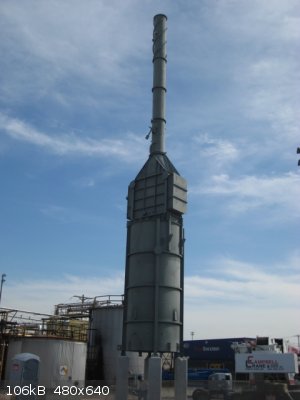bwpatton1
Harmless

Posts: 26
Registered: 21-12-2010
Member Is Offline
Mood: No Mood
|
|
Searching for large glassware
I have done a little home chemistry here and there over these past couple years and now I'm wanting to get into alternative fuels as I go off to
college. Im looking for larger round bottom boiling flasks and bigger Erlenmeyer flasks to react small quantities of biodiesel and manufacture
ethanols. I made my first batch of biodiesel the other day and had to scale the amounts down because the largest beaker I has was a 1L! Any glassware
larger than 1L is helpful, I don't mind making stuff work. If anybody has any larger stuff they are looking to get rid It would be greatly
appreciated, send me a PM. 
Bradley
|
|
|
aga
Forum Drunkard
    
Posts: 7030
Registered: 25-3-2014
Member Is Offline
|
|
There are many forums out there related to biodiesel.
I knew one guy who used discarded hot water heaters after removing the heating element and cleaning thoroughly.
|
|
|
bwpatton1
Harmless

Posts: 26
Registered: 21-12-2010
Member Is Offline
Mood: No Mood
|
|
I will be constructing the "appleseed" style processor which utilizes a modified water heater at some point in the future. I wanted to be able to
experiment with blends in smaller batches first, thus the need for glassware. I guess I could use HDPE bottles but what is the fun in that?
|
|
|
hyfalcon
International Hazard
    
Posts: 1003
Registered: 29-3-2012
Member Is Offline
Mood: No Mood
|
|
If you're into biodiesel then check this business out. I've ordered from them several times.
https://www.dudadiesel.com/
Container porn
https://www.dudadiesel.com/search.php?query=%2Bcone+%2Btank+...
[Edited on 5-7-2015 by hyfalcon]
|
|
|
byko3y
National Hazard
   
Posts: 721
Registered: 16-3-2015
Member Is Offline
Mood: dooM
|
|
My 10 L Woolf bottle got a crack really fast. It's a known problem with large glassware: it's fragile, it has low heat resistance, and those are the
reasons why large glassware is rarely used and costs a lot. Percelain has all the properties of glass, plus it has much better heat resistance for
thick walled devices. Just a regular shitty 5 mm thick porcelain has heat shock resistance of 2 mm thick borosilicate glass and can withstand up to
1100°C temperature, while 600°C is a maximum for a borosilicate glass, and quartz devices cost A LOT. I would be glad to own some porcelain flasks
with ground joints.

But for most of devices a metal is used. The metal rocks. It's rigid, and at the same time it can be modified at any time (holes, connections), and
can be repaired after an incident. Using simple devices you can assemble a device from copper and solder which can withstand up to 300°C.
|
|
|
Funkerman23
Hazard to Others
  
Posts: 416
Registered: 4-1-2012
Location: Dixie
Member Is Offline
Mood: No Mood
|
|
Quote: Originally posted by byko3y  | My 10 L Woolf bottle got a crack really fast. It's a known problem with large glassware: it's fragile, it has low heat resistance, and those are the
reasons why large glassware is rarely used and costs a lot. Percelain has all the properties of glass, plus it has much better heat resistance for
thick walled devices. Just a regular shitty 5 mm thick porcelain has heat shock resistance of 2 mm thick borosilicate glass and can withstand up to
1100°C temperature, while 600°C is a maximum for a borosilicate glass, and quartz devices cost A LOT. I would be glad to own some porcelain flasks
with ground joints.
But for most of devices a metal is used. The metal rocks. It's rigid, and at the same time it can be modified at any time (holes, connections), and
can be repaired after an incident. Using simple devices you can assemble a device from copper and solder which can withstand up to 300°C.
|
If Dr Bob or the old gaurd chimes in to agree( not that I doubt your statement) then you may have just
saved me 60 bucks( if not more). I was mulling over a 4 liter beaker/ flask& mantle & stirrer set up with much of the OP's needs in mind: bulk
preparations. I've used , and use, flasks up to 3 liters but trying to get anything for larger volumes is hit or miss, with HUGE problems getting it
all together for a reasonable cost.A decent 5 liter mantle is $200 plus, the overhead stirrer,paddles& needed bearings 'n such is another $250
plus and the flasks alone are almost always over $70. Not so easy on a undergrads ramen budget. Going the rubber stopper route might save SOME money
but Butyl rubber isn't resistant to everything and silicone has its weak points too( good luck finding large amounts of silicone stoppers in an
amateur friendly business). Pardon the wall text.
" the Modern Chemist is inundated with literature"-Unknown
|
|
|
bwpatton1
Harmless

Posts: 26
Registered: 21-12-2010
Member Is Offline
Mood: No Mood
|
|
Both very valid points. I hadn't considered the heat resistance of the borosilicate glass in larger quantities. I was merely looking to the glass to
for the resistance to more chemicals, biodiesel has a tendency to be corrosive. I might have to change my approach to this topic, further research is
required.
|
|
|
The Volatile Chemist
International Hazard
    
Posts: 1981
Registered: 22-3-2014
Location: 'Stil' in the lab...
Member Is Offline
Mood: Copious
|
|
So, basically, to summarize, we all would like to own O. Chem reactors and the like. OK.  There's some nice ones on AliBaba and Aliexpress for cheap, say $1000 a pop in bulk... There's some nice ones on AliBaba and Aliexpress for cheap, say $1000 a pop in bulk... 
|
|
|
Funkerman23
Hazard to Others
  
Posts: 416
Registered: 4-1-2012
Location: Dixie
Member Is Offline
Mood: No Mood
|
|
Quote: Originally posted by The Volatile Chemist  | So, basically, to summarize, we all would like to own O. Chem reactors and the like. OK.  There's some nice ones on AliBaba and Aliexpress for cheap, say $1000 a pop in bulk... There's some nice ones on AliBaba and Aliexpress for cheap, say $1000 a pop in bulk...  |
Oh Lord, is there some truth in that!
" the Modern Chemist is inundated with literature"-Unknown
|
|
|
The Volatile Chemist
International Hazard
    
Posts: 1981
Registered: 22-3-2014
Location: 'Stil' in the lab...
Member Is Offline
Mood: Copious
|
|
There is indeed. Too bad my reactions don't work in large glass vessels - like vinegar bottles :/
|
|
|
aga
Forum Drunkard
    
Posts: 7030
Registered: 25-3-2014
Member Is Offline
|
|
Conjecture:-
If you do not know it will work at X scale, then glass is best, so you can see what is going on, and panic accordingly if it mis-behaves.
I guess this is one of the differences between amateur and industrial chemistry.
You tend not to see any industrial sites with 200,000 litre RBFs, and the Bunsen from Hell driving it.
|
|
|
zed
International Hazard
    
Posts: 2283
Registered: 6-9-2008
Location: Great State of Jefferson, City of Portland
Member Is Offline
Mood: Semi-repentant Sith Lord
|
|
Ummm. Strong bases of the biodiesel type, aren't terribly compatible with glass.
HDPE is nice. Resists NaOH, and it can take a fair amount of heat.
Locally, used 55 gallon drums sell for about 10 to 20 dollars each.
|
|
|
skip
Hazard to Self
 
Posts: 54
Registered: 16-5-2015
Member Is Offline
Mood: No Mood
|
|
You don't need glass to make bio -D. The reactors are made of plastic for this.
|
|
|
Magpie
lab constructor
    
Posts: 5939
Registered: 1-11-2003
Location: USA
Member Is Offline
Mood: Chemistry: the subtle science.
|
|
Quote: Originally posted by aga  |
You tend not to see any industrial sites with 200,000 litre RBFs, and the Bunsen from Hell driving it. |
Here's a picture of a Bunsen burner on steroids  . It is used for heating
incoming crude oil at refineries: . It is used for heating
incoming crude oil at refineries:

The single most important condition for a successful synthesis is good mixing - Nicodem
|
|
|
The Volatile Chemist
International Hazard
    
Posts: 1981
Registered: 22-3-2014
Location: 'Stil' in the lab...
Member Is Offline
Mood: Copious
|
|
Great! All we need now is an awesome glassblower to make a 200,000L RBF! Make it have at least a few 24/40 connections on it, please.
|
|
|